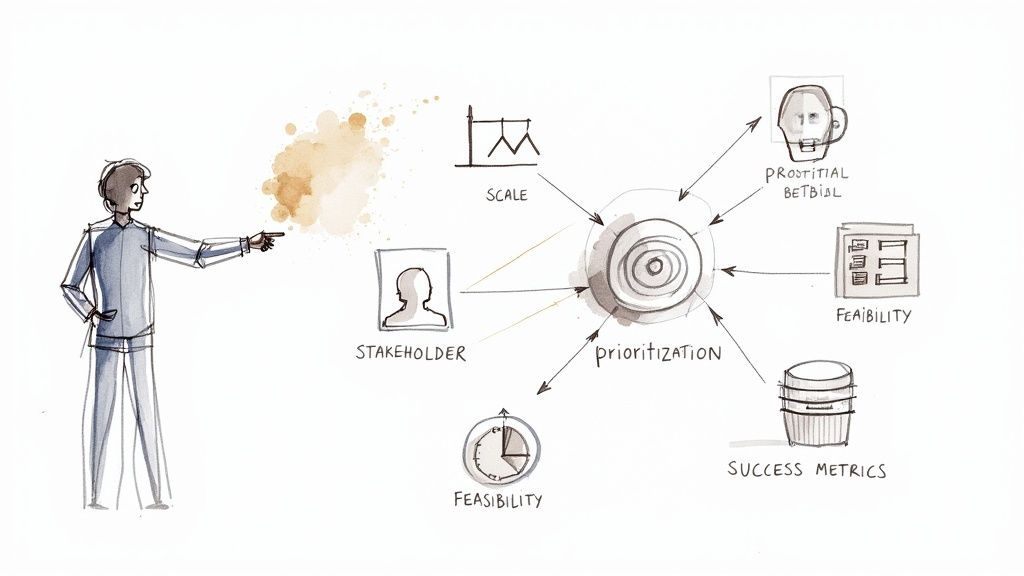Hiring a Strategic Planning Consultant
Unlock growth by hiring a strategic planning consultant. This guide covers when to hire, what to expect, and how to maximize your ROI with expert guidance.
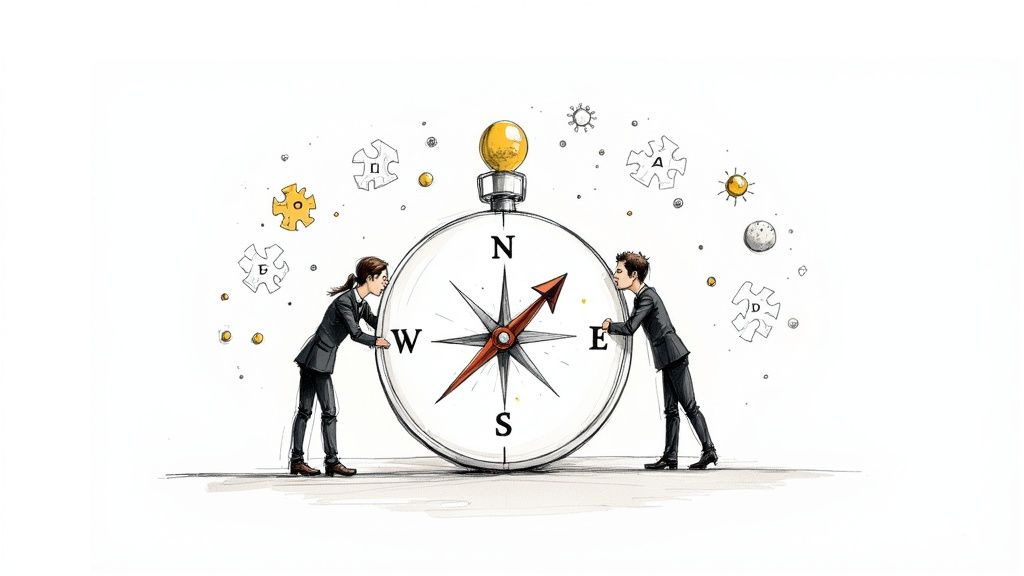
Think of a strategic planning consultant as an experienced guide for a business navigating uncharted waters. They're the ones with the map and compass, helping you define a clear destination (your vision), plot the best course to get there (your goals), and create a turn-by-turn roadmap that your entire team can follow. In today's complex business world, this isn't a luxury; it's essential for survival and growth.
The Evolving Role of a Strategic Planning Consultant
A top-tier strategic planning consultant does far more than just facilitate a few workshops. Their real value comes from providing an objective, outside-in perspective. They step away from the day-to-day operational noise and internal politics to give you an honest assessment of where your business truly stands and where it realistically needs to go.
This fresh viewpoint is crucial for cutting through ingrained biases and challenging the "that's how we've always done it" mindset that quietly kills innovation. A great consultant isn’t afraid to ask the tough questions and facilitate the difficult conversations needed to get everyone aligned. Ultimately, they ensure your leadership team is rowing in the same direction, towards the same goal.
Core Functions and Real-World Value
A high-calibre consultant doesn't just skim the surface; they deliver deep, organisational value by concentrating on a few critical areas:
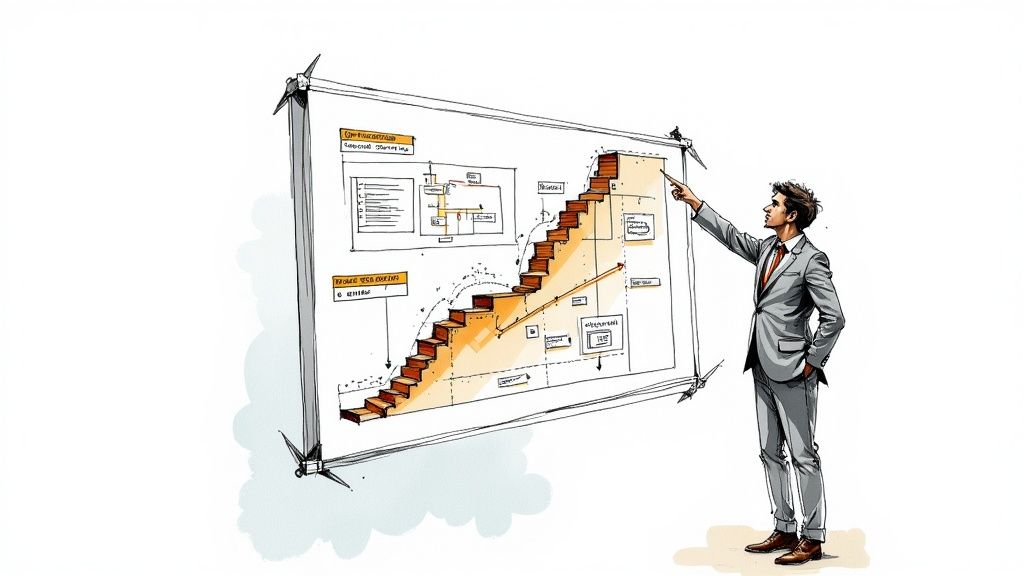 Objective Analysis: They perform rigorous deep dives into your market, competitors, and internal strengths and weaknesses, free from the influence of company culture or personal agendas.
Objective Analysis: They perform rigorous deep dives into your market, competitors, and internal strengths and weaknesses, free from the influence of company culture or personal agendas.Structured Process: Instead of a chaotic, unstructured brainstorming session, they bring proven methodologies and frameworks. This turns what can be an overwhelming task into a manageable project with clear phases, milestones, and outcomes.
Facilitating Alignment: Perhaps their most vital role is building consensus. They work to ensure the final strategy has genuine buy-in from the entire leadership team, which is the secret to successful implementation.
Specialised Expertise: Consultants bring a wealth of knowledge from different industries and situations, offering fresh insights and solutions an internal team simply wouldn't have access to.
The demand for this kind of external expertise is booming. Take the European management consulting market, for instance, where Germany is a major player. It's projected to be worth €74.68 billion in 2025. Experts forecast it will grow at a compound annual growth rate of 6.06% through 2033, largely because increasing business complexity requires seasoned strategic guidance. You can discover more about European consulting market trends to see the full picture.
A skilled consultant doesn't just hand you a plan; they help you co-create a future. The process itself—full of challenging discussions and lightbulb moments—is often just as valuable as the final document.
When a Strategic Planning Consultant Is Most Valuable
Deciding to bring in a consultant often happens at a critical juncture. The table below outlines some common business scenarios where their expertise provides the most significant impact.
Business Scenario | Why a Consultant Is Critical | Primary Outcome |
|---|---|---|
Market Disruption | An outside perspective is needed to assess threats and uncover new opportunities without internal bias. | A resilient, adaptive strategy to navigate change and maintain a competitive edge. |
Stagnant Growth | The business is stuck, and internal teams can't identify the root cause or a path forward. | Fresh, innovative growth strategies and a clear, actionable plan to reignite momentum. |
Pre-Merger or Acquisition | Objective due diligence and integration planning are required to ensure a smooth transition and maximise value. | A unified strategic vision and a detailed integration roadmap for the newly formed entity. |
Leadership Misalignment | The executive team has conflicting visions for the company's future, causing friction and inaction. | A cohesive, agreed-upon strategic direction with full leadership buy-in and commitment. |
Entering a New Market | Lack of in-house experience with the target geography, culture, or customer base creates significant risk. | A well-researched, de-risked market entry strategy that accelerates time-to-value. |
If you recognise your organisation in any of these situations, it's a strong signal that an external strategist could unlock significant value.
How Technology Is Changing the Game
The field of strategic planning is also being reshaped by technology. Modern consultancies are increasingly using advanced tools to make their work faster and more insightful. This is where solutions like AI strategy consulting are making a real difference.
By automating heavy-duty data analysis and predictive modelling, these platforms free up human experts to do what they do best: provide nuanced advice, coach leaders through tough decisions, and navigate complex team dynamics. This powerful blend of human expertise from our expert team and technological efficiency is the future of strategic planning. It makes the entire process faster, more data-driven, and ultimately, far more effective.
Recognising the Signs You Need a Strategic Partner

The moment a business needs a strategic planning consultant rarely arrives with a sudden bang. It's more of a slow burn—a growing collection of subtle but nagging problems that begin to sap an organisation’s energy and focus. Spotting these early warnings is your first step toward getting back on track and steering your company towards real, intentional growth.
Perhaps the most telling sign is when growth simply hits a wall. Maybe sales are flatlining, or your market share has started to stagnate. You keep setting ambitious revenue targets but find yourselves narrowly missing them, quarter after quarter. Internally, this often feels like running in mud; the drive that once pushed the company forward has been replaced by a frustrating sense of inertia.
This stagnation often goes hand-in-hand with a lack of internal alignment. You start seeing different departments pulling in opposite directions, each chasing its own goals without a shared vision. The marketing team might launch a brilliant campaign that has nothing to do with what the sales team is trying to achieve. Meanwhile, your product team is busy building features that don't solve a clear customer problem. The result? Wasted effort, internal friction, and a confused, disjointed experience for your customers.
Common Organisational Pain Points
When these foundational cracks appear, trying to tackle big strategic challenges can feel almost impossible. A strategic planning consultant becomes crucial when you're facing complex hurdles that your current team just isn’t equipped to handle on its own.
Here are a few classic scenarios that should set off alarm bells, signalling it’s time to bring in an expert:
Facing Technological Disruption: Your entire industry is being turned upside down by new tech like AI. You know you need to adapt, but you lack the in-house expertise to figure out the threats and opportunities. You need a clear roadmap to move forward without making expensive mistakes.
Attempting Market Entry: You're looking to expand into a new country or tap into a completely new customer base, but you’re essentially flying blind. The risks are enormous, and a failed attempt could set you back significantly.
Integrating ESG Goals: Your stakeholders—from customers and investors to your own employees—are demanding a real commitment to Environmental, Social, and Governance (ESG) principles. The challenge is weaving these goals into your core business strategy so they feel authentic and impactful, not just like a box-ticking exercise.
In situations like these, the cost of doing nothing is far higher than the investment in expert guidance. It's a cost measured in lost opportunities, sinking team morale, and giving up precious ground to your competitors.
The High Cost of Strategic Paralysis
Hesitating to hire a strategic planning consultant usually comes down to one thing: the upfront cost. But the real, hidden cost lies in strategic paralysis—that feeling of being stuck, unable to make confident, forward-thinking decisions. This indecision quietly bleeds resources and hands over market share to competitors who are moving faster.
This need for sharp, decisive strategy is especially clear in strong economies. Take Germany, for instance, where the strategic consulting market hit roughly USD 38.1 billion in 2022. This surge was fuelled by a nationwide push for digital transformation, backed by a major government fund. It’s a perfect example of how critical expert guidance becomes when navigating massive, complex change.
Without a structured plan, internal conflicts fester as teams start pointing fingers, blaming each other for the lack of progress. Before you know it, your best people start to disengage and look for opportunities elsewhere—in companies with a clearer sense of purpose and direction.
Preparing for a Strategic Engagement
Before you even start talking to consultants, it’s vital to get a clear picture of your own challenges and goals. This bit of homework makes the entire engagement far more efficient and effective. Today, modern tools can give you a huge head start in this preparatory phase.
For example, an AI-powered AI requirements analysis can help you articulate your problems and objectives with real precision. By using a tool like this, you crystallise your own thinking and can hand a consultant a clear, well-defined starting point. This initial step doesn't just save time; it ensures the work is laser-focused on solving the right problems from day one. It also lays the groundwork for a robust AI strategy framework that will guide your organisation long into the future.
What You Actually Get from a Strategic Engagement
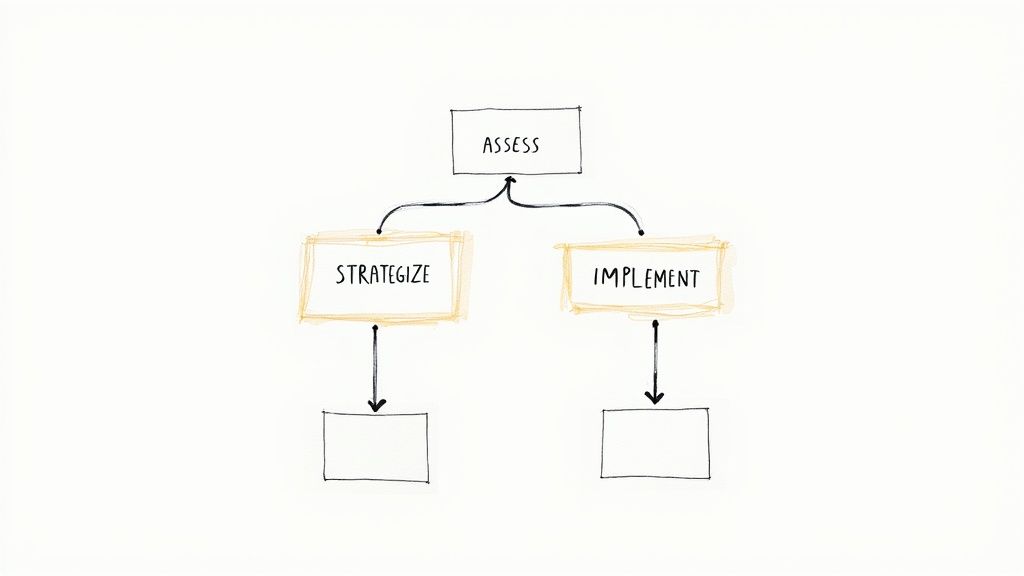
When you decide to bring in a strategic planning consultant, you’re not just paying for a few conversations and some advice. You’re investing in tangible outcomes—concrete tools designed to steer your business toward its goals. Knowing what these deliverables look like helps to demystify the consulting process and shows you exactly where your investment goes.
A quality engagement won’t leave you with a pile of abstract theories. It delivers real, usable assets. The final strategic plan might be the star of the show, but it’s supported by a whole cast of critical components that ensure your strategy is built on solid ground and ready to execute.
The Tangible Outputs of a Consulting Partnership
Think of a comprehensive strategic engagement as building a complete navigation system for your company. You get the maps, the turn-by-turn directions, and the dashboards to monitor your progress. It's a full suite of interconnected documents that guide your future.
Here’s what you can typically expect to have in hand:
Market and Competitive Analysis: This is the foundational report. It’s a deep dive that sizes up your performance against key competitors and uncovers the market trends, hidden threats, and golden opportunities on the horizon. Every decision from this point on is rooted in this reality check.
A Clear Strategic Plan: This is the core document, but it shouldn't be a 100-page paperweight. A great plan is a concise, powerful statement of your long-term vision, your mission, and the handful of strategic pillars that will get you there.
Actionable Implementation Roadmap: Here’s where strategy meets reality. This roadmap breaks down the big ideas into concrete initiatives, assigns ownership to specific teams or people, and lays out clear timelines and resource requirements. It's the "how."
Financial Models and Projections: These are the spreadsheets that show you the money. A set of forecasts will model the potential financial impact of your strategy, helping you understand the ROI and get the necessary budget buy-in.
Key Performance Indicators (KPIs): You can't manage what you don't measure. You'll get a curated list of metrics to track progress against your goals, allowing you to monitor success objectively and make adjustments based on real data, not guesswork.
Risk Assessment Matrix: This is an honest look at what could go wrong. It identifies potential internal and external risks that could throw your strategy off course and, more importantly, outlines plans to manage them before they become problems.
The most crucial deliverable isn't a document you can hold, but an outcome you can feel: genuine alignment. A great strategic planning consultant facilitates a process where your entire leadership team builds and commits to a shared vision, eliminating the friction that stifles growth.
A Modern Approach to Building Your Strategy
In a world that moves this fast, how you create these deliverables is just as important as the documents themselves. Modern consultants and platforms lean on structured frameworks to make sure the process is both thorough and efficient. This is exactly where an AI strategy framework can add tremendous value, guiding your team through every stage, from initial analysis to final execution.
This structured method, often powered by an AI Strategy consulting tool, ensures that no stone is left unturned. It guarantees the final plan isn’t just a collection of nice ideas but a cohesive, data-backed strategy that’s truly ready for the real world.
This process-driven approach is at the heart of modern AI strategy consulting, making sure every deliverable connects logically to the next. The result is a powerful, unified roadmap for your organisation. It's this fusion of sharp human insight and a structured process—what we call AI co creation—that ultimately defines a successful outcome.
Choosing the right strategic planning consultant is one of the most important calls a leadership team will ever make. This isn't just about hiring a temporary contractor; you're looking for a partner who can challenge your thinking, guide your decisions, and truly collaborate to build your company's future. The right choice is about much more than a price comparison—it’s a deep dive into expertise, methodology, and that all-important cultural fit.
Think of the selection process as being just as critical as the strategic work itself. You're giving this person or firm access to your most sensitive information and trusting them with your most critical long-term moves. The goal, then, is to find someone who brings more than just knowledge. You need a partner who can integrate with your leadership team, ask the tough questions, and constructively challenge the way things have always been done.
How to Select the Right Strategic Consultant
So, where do you begin? It starts with a rigorous evaluation of their background and how they approach their work.
Evaluating Industry Expertise and Proven Success
First things first: you need to verify they have relevant experience. A consultant who has already navigated challenges similar to yours brings an incredible amount of foresight to the table. Don't settle for a generalist. Look for a strategic planning consultant with a clear, demonstrable track record in your specific industry or with companies at a similar stage of growth.
You need to scrutinise their past work with a critical eye. Ask for detailed case studies, but don't be afraid to dig deeper than the glossy highlights.
Ask About the Bumps in the Road: What went wrong during their previous projects? How did they adapt when things didn't go according to plan? A good consultant has stories of failure and learning, not just success.
Talk to Their Past Clients: Request references and actually call them. This is your chance to get an unfiltered view of the consultant’s facilitation style, their communication habits, and the real-world impact they had.
Understand Their Process: A top-tier consultant should be able to walk you through their methodology. Is it a rigid, cookie-cutter model they apply to everyone, or is it a flexible framework they can adapt to fit your unique situation?
For instance, at Ekipa, we believe in transparency. Seeing tangible results is key. That's why having access to real-world use cases is so valuable—it shows you how targeted strategic work can drive measurable improvements across different sectors.
The right partnership can turn strategic planning from a purely academic exercise into a powerful catalyst for real-world performance boosts, as the data below illustrates.
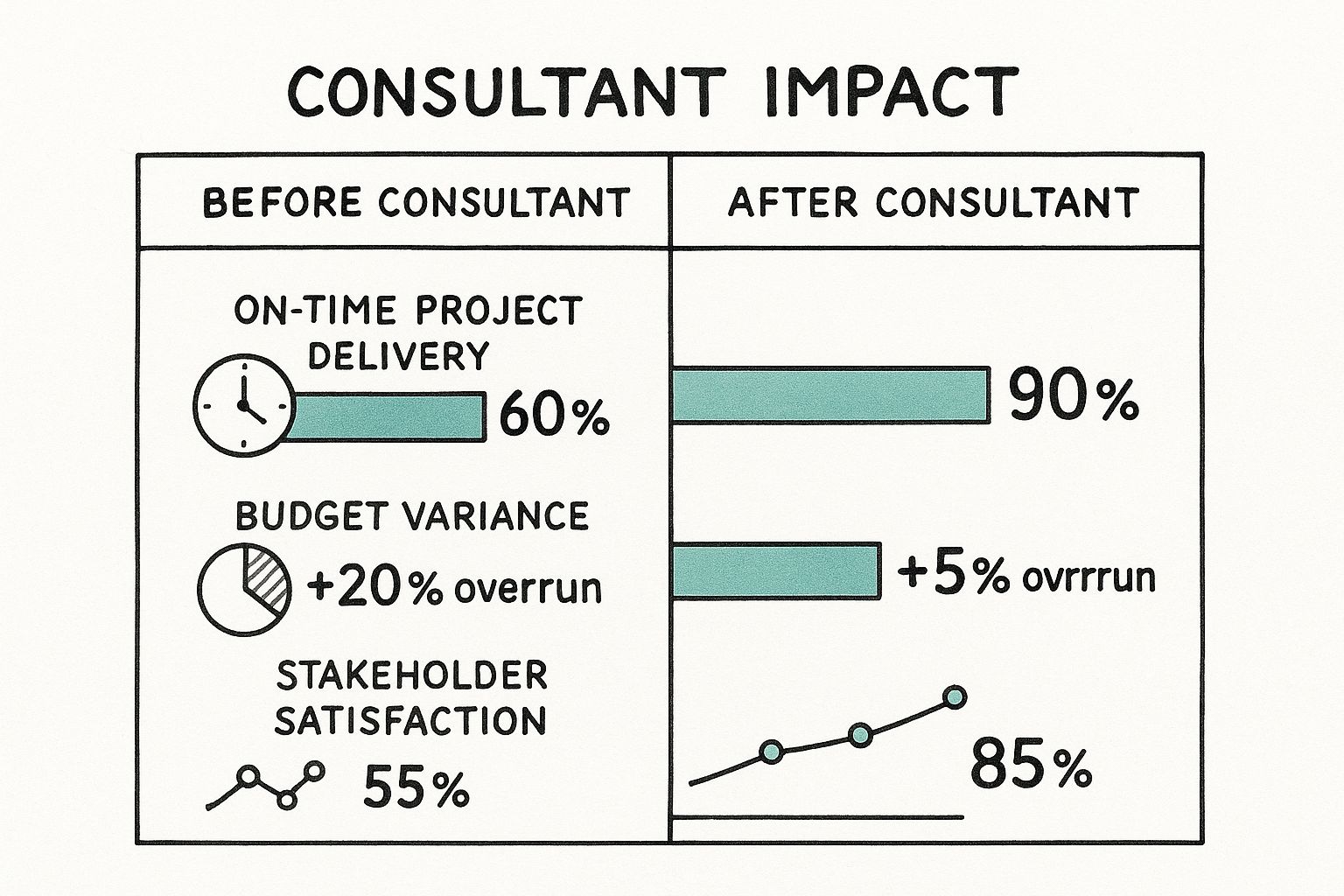
It’s clear from this kind of data that the right consultant doesn't just deliver a plan; they help you execute it more efficiently and effectively.
Assessing Cultural Fit and Collaborative Style
While expertise gets a consultant in the door, cultural fit is what makes the relationship click. Your consultant must be able to build genuine trust and rapport with your executive team. They need the confidence to challenge long-held beliefs but also the emotional intelligence to do it without putting everyone on the defensive.
A great consultant doesn’t just give you the answers. They create an environment where your team can discover the best answers together through a process of guided exploration and debate.
This collaborative spirit is the absolute bedrock of our AI co creation philosophy. It’s all about blending the sharp insights of an external expert with the deep-seated knowledge of your own team. The result? A strategy that is both ambitious and, crucially, achievable. A consultant who acts as a facilitator, not a dictator, ensures the final plan has the authentic buy-in it needs to succeed. After all, the human element is what makes it all work; feel free to get to know our expert team and see the people behind our technology-powered approach.
The Consultant Selection Checklist
To help you navigate this critical decision, we've put together a checklist. It contrasts the traditional way of thinking with the modern factors you should consider, especially in a world where technology plays a bigger role.
Evaluation Criterion | What to Look For | Red Flags to Avoid |
|---|---|---|
Industry Experience | Deep, specific knowledge in your niche; has solved similar problems before. | Generalist experience that doesn't align with your unique challenges. |
Methodology | A flexible, adaptable framework that can be tailored to your organisation. | A rigid, one-size-fits-all process with no room for customisation. |
Cultural Fit | A collaborative partner who can challenge and guide with emotional intelligence. | A "dictator" style that imposes ideas without fostering team buy-in. |
Track Record | Verifiable case studies and glowing client references who can speak to results. | Vague success stories with no data or a reluctance to provide references. |
Technology Integration | Uses modern tools (like AI) to enhance data analysis, modeling, and collaboration. | An old-school, purely analogue approach that can be slow and less data-driven. |
Communication Style | Clear, direct, and transparent. Acts as a facilitator for your team. | Jargon-filled, overly academic communication that creates confusion, not clarity. |
Using a checklist like this ensures you're not just wowed by a slick presentation but are making a well-rounded decision based on what truly matters for a successful partnership.
The Rise of Technology-Enabled Consulting
The world of consulting is changing, especially in major European hubs. Take Germany, for example, where the management consulting industry was valued at around €47.7 billion in 2025. A huge chunk of that growth is coming from new demands, like ESG consulting, which took off after EU regulations required large companies to report on their social and environmental impact. You can learn more about the drivers of the German consulting market to see these trends in action.
This shift highlights a growing need for consultants who can navigate increasingly complex data and regulatory landscapes. The best modern firms now combine sharp human insight with powerful technology. Look for partners who use platforms to streamline data analysis, run what-if scenarios, and make collaboration seamless. An AI Strategy consulting tool can dramatically speed up the process, offering deeper insights and making the entire engagement more efficient and transparent. This blend of human expertise and AI power isn’t just a trend—it’s the new standard for high-impact strategic consulting.
Getting the Most Out of Your Consulting Investment
Hiring a strategic planning consultant is a significant outlay of both time and money. To make sure it pays off, you need to stop thinking of yourself as a passive client and start acting like an active partner in the process. Honestly, the success of the engagement hinges just as much on your team’s preparation and involvement as it does on the consultant’s expertise.
This journey starts well before the first workshop ever kicks off. Your most important job is to get your internal team ready for what's ahead. This means building a culture where people feel safe to be transparent—sharing data, admitting to real challenges, and questioning old assumptions isn't just okay, it's encouraged. A consultant can only build a strategy with the information you provide; hiding data or glossing over problems will only lead you to a plan built on a shaky foundation.
Creating a Collaborative Atmosphere
To keep communication clear and avoid sending mixed signals, you absolutely must appoint a single, empowered point of contact inside your company. This person will be the main go-between, responsible for organising meetings, chasing down data, and making sure the consultant has everything they need. This simple step keeps the consultant from getting pulled in a dozen different directions and ensures the project stays on track.
As for your team, their job is to be fully engaged. This isn't a lecture series where your leaders can just sit back and listen. It’s a hands-on workshop where they need to contribute, debate, and build the strategy together.
The real magic doesn’t come from the final report. It comes from the process itself—the tough conversations, the deep analysis, and those shared moments of clarity when everything clicks. The consultant is your guide, but the strategy must belong to your team.
This deep involvement is the cornerstone of a great outcome. You should be thinking about implementation from day one, not waiting until the consultant hands you a binder. When your team helps build the strategy, they develop a powerful sense of ownership, and that’s the most critical factor in making sure the plan actually gets implemented. For a truly immersive and collaborative kick-off, a structured strategy workshop can be an excellent way to get your team aligned from the very beginning.
Using Technology to Boost Your ROI
Modern tools can make a huge difference in how efficient and transparent the consulting process is, directly impacting your return on investment. An AI Strategy consulting tool, for example, can serve as a central hub for all your data and collaboration. It creates a single, shared workspace where your team and the consultant can work together effortlessly.
This tech-supported approach offers a few clear benefits:
Better Transparency: Everyone with access can see the same data, follow the progress, and understand the thinking behind strategic decisions as they happen.
More Efficiency: Automating the grunt work of data collection and initial analysis frees up precious time for both your team and the consultant. This lets everyone focus on what really matters: high-level strategic thinking.
Stronger Collaboration: A shared digital platform naturally encourages ongoing conversation. It makes it easy for team members to chip in with ideas and feedback at any point in the process.
At the end of the day, a successful consulting engagement is a true partnership. By preparing your team, fostering a culture of openness, and using collaborative tools, you set the stage for your consultant to do their best work. This active, participatory approach ensures the final strategy isn't just another document gathering dust, but a living roadmap your entire organisation is excited to bring to life.
Here's the rewritten section, designed to sound like it was written by an experienced human expert.
The Future of Strategy: Where AI Meets Human Expertise
The role of a strategic planning consultant is changing right before our eyes. The days of the consultant as a lone advisor are fading, replaced by a new model: the tech-enabled partner. The future isn't about pitting artificial intelligence against human experts; it's about a powerful collaboration where each makes the other better. AI and advanced analytics aren't here to replace consultants but to become indispensable tools in their toolkit.
This partnership creates a much more effective way to build strategy. Think of AI as the ultimate research assistant, capable of doing the heavy lifting—ploughing through massive datasets, spotting subtle market shifts, and running thousands of 'what-if' scenarios in minutes. This frees up the human consultant to focus on what people do best: read the room, understand complex cultural dynamics, and coach leaders through tough but necessary changes.
The Power of the Hybrid Model
Let’s make this real. Imagine a consultant using an AI platform to process a decade's worth of a competitor's performance data. Almost instantly, the AI flags a hidden vulnerability in that rival's supply chain—an insight that might have taken weeks of manual analysis to uncover. The consultant can immediately pivot the strategic conversation with their client, focusing on how to capitalise on this newfound opportunity.
That’s the essence of the modern approach. It delivers some clear advantages:
Faster Insights: What used to take months of painstaking research can now be done in hours. This dramatically speeds up the entire strategic planning cycle.
More Accurate Forecasting: AI-driven models can stress-test strategies against countless variables, giving you a much more reliable picture of potential outcomes and risks.
Deeper Strategic Conversations: With data analysis handled by the machine, consultants and leadership teams can spend their time on what truly matters—high-level thinking, creative problem-solving, and getting everyone on the same page.
The goal is no longer just to create a static plan. It's to build a living strategy that can adapt in real time, blending the raw computational power of AI with the irreplaceable wisdom of human experience.
Leading the Evolution of Strategic Consulting
At Ekipa, we're not just watching this evolution happen; we're actively shaping it. We’ve built our services around this potent mix of technology and deep consulting expertise. As we explored in our AI adoption guide, this modern approach is crucial for any business serious about staying competitive. Our platform enables a seamless AI co creation process, bringing your team and our experts together.
This hybrid model combines the analytical power of our AI Strategy consulting tool with the hands-on guidance of seasoned strategists. Whether it's using our AI requirements analysis tool to kick things off or exploring real-world use cases for inspiration, we offer a complete AI strategy consulting experience. The future of strategy is a partnership between brilliant minds and powerful technology, and it's already here.
To see how this blend can work for you, we invite you to connect with our expert team.
Frequently Asked Questions
Hiring a strategic planning consultant is a big step, and it’s natural to have questions. To help clear things up, here are some of the most common queries we hear from business leaders weighing their options.
What’s the Real Difference Between Strategic and Management Consultants?
This is a common point of confusion, so let's break it down simply. Think of management consulting as a broad field covering almost any aspect of a business—from fine-tuning your factory floor to overhauling your HR policies.
A strategic planning consultant, on the other hand, is a specialist. Their job is laser-focused on the biggest questions: Where is this company headed in the next five years? How will we win in our market? Why do we exist? They help you craft the vision. Other consultants often come in later to figure out the "how."
How Much Does a Strategic Planning Consultant Cost?
There's no single price tag; the cost can swing wildly. A short, intensive workshop might cost a few thousand, while a months-long, deep-dive project with a top-tier firm can easily run into six figures. It all depends on the scope of the work and the consultant's experience.
The best way to think about it isn't as an expense, but as an investment. What’s the potential return? It's also worth noting that newer approaches, like using an AI Strategy consulting tool, are making the process more affordable by automating some of the heavy lifting in analysis and collaboration.
How Long Does the Strategic Planning Process Take?
The timeline really hinges on the size and complexity of your organisation. For a small to medium-sized business, you could be looking at a focused six to eight-week engagement. For a large corporation rethinking its entire market position, the process could easily stretch over four to six months.
The trick is finding the right balance. You need to be thorough enough to create a solid plan but nimble enough that the strategy doesn't become outdated before it's even finished.
How Do We Make Sure the Plan Doesn’t Just Collect Dust?
This is probably the most important question you can ask. A brilliant strategy is worthless if it never leaves the presentation deck. Real success comes from building ownership right from the start. As we’ve discussed before, getting your key people involved through AI co creation is absolutely crucial.
A good consultant builds implementation directly into the process. They'll deliver a clear, actionable roadmap with names, deadlines, and measurable goals attached. Many will even stick around to help you get the ball rolling. When your team helps build the plan, they're far more likely to see it through. It becomes their plan, not just the consultant’s.
Ready to transform your strategic planning from a lengthy, expensive process into a fast, data-driven journey? Ekipa AI delivers tailored AI strategies and actionable roadmaps, blending powerful technology with the guidance of our expert team.


